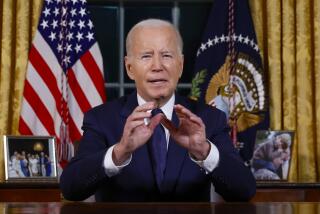Obama and foreign policy: It shouldn’t be personal
- Share via
When President Obama looks into the eyes of foreign leaders in the months ahead, he should search out their interests, not the depths of their souls.
President Bush found himself basing foreign policy too much on personal relationships rather than on the complex and often messy issues of state. Although chemistry between leaders is a potent and vital ingredient in foreign policy, Bush’s over-reliance on personal dynamics made the U.S. too pliant with some friends and too rigid with some adversaries. The result was our inability to leverage allies and enemies alike.
Start with our friends. The United States has been suffering from a Putin-Musharraf-Karzai-Saakashvili syndrome. Once leaders such as these are identified as friends and partners, Washington acts if they can do no wrong. Rather than an interests-based relationship of give-and-take, U.S. policymakers often find themselves struggling to apply pressure to leaders who are dependent on U.S. support.
With Afghanistan and Iraq, the consequences are particularly grave -- U.S. troops are dying while Washington fails to exert enough leverage to push political progress and good governance. If a leader such as Iraqi Prime Minister Nouri Maliki knows that whoever is in the White House will tell him weekly that he’s doing a great job, regardless of the reality, why bother listening to the hard advice from U.S. diplomats and commanders on the ground? Ditto Afghanistan President Hamid Karzai.
Of course, it is important for world leaders to have personal rapport. Bill Clinton’s bonhomie with Boris Yeltsin, for example, helped keep U.S.-Russian relations from veering off a cliff during the 1990s. But lately, Washington has suffered from something you could call the “Chalabi effect” -- a tendency to be seduced by foreign personalities with finely tailored suits and crisp English. (Named after the former Bush administration favorite who supplied much of the faulty intelligence on Iraq leading up to the invasion in 2003.)
Our clinging to former Pakistan leader Pervez Musharraf despite ongoing Pakistani support for the Taliban and never-filled promises to restore democracy undermined U.S. credibility. Similarly, our relations with Georgia are defined by Mikheil Saakashvili, its charismatic, English-speaking leader who conducted a forceful charm offensive in Washington. With Russia spoiling for a fight, he gave Moscow the excuse it needed to “liberate” two restive Georgian provinces, and Americans are now on the hook for $1 billion to rebuild this tiny country. Were Saakashvili to go the way of former Soviet leader Mikhail Gorbachev and start doing Louis Vuitton ads, we would be dumbfounded by what to do next.
What’s worrisome is that there are many Chalabi-like politicians in the world’s capitals who Obama may accidentally befriend.
The flip side of being seduced by a glance into someone’s soul is wishing away unsavory adversaries. Personalizing our enmity does little to find areas of common agreement that could ratchet down tensions. President Mahmoud Ahmadinejad is but one piece of Iran’s foreign policy machine, and that machinery has some overlapping interests with Washington in maintaining stability in Iraq and Afghanistan. Maybe his vitriol merits complete disengagement, but that should not prevent us from having a plan in place to engage Iran the day he leaves office. U.S. policies toward Cuba and North Korea also focus on the person instead of the polity, leaving us unprepared when the Castros and Kim Jong Il pass from the scene.
Of course, it’s only natural to prefer the devil we know -- and like for the wrong reasons -- but the costs of too much backslapping, first-name calling and uncritical support often outweigh the benefits. The prospects of Musharraf leaving office in Pakistan were so unsettling that we failed to prepare for his inevitable fall. And in the Middle East, we could not comprehend the rise of Hamas in Gaza over our chosen partner, Palestinian Authority President Mahmoud Abbas.
Obama should run through our present policies with countries of strategic importance and ask: Is our bilateral relationship -- or lack thereof -- based too much on personal bonds or bad blood? If so, then retool relations.
This advice goes both ways. World leaders are breathing sighs of relief at the passing of the George W. Bush era. But they risk becoming overly infatuated with Obama. When they look into his eyes, they would do well to seek out American national interests, most of which stay relatively constant across administrations. Whenever foreign policy gets too personalized and chummy, the world is worse off for it.
Lionel Beehner is a writer in New York. Vikram J. Singh is a fellow at the Center for a New American Security.
More to Read
A cure for the common opinion
Get thought-provoking perspectives with our weekly newsletter.
You may occasionally receive promotional content from the Los Angeles Times.









